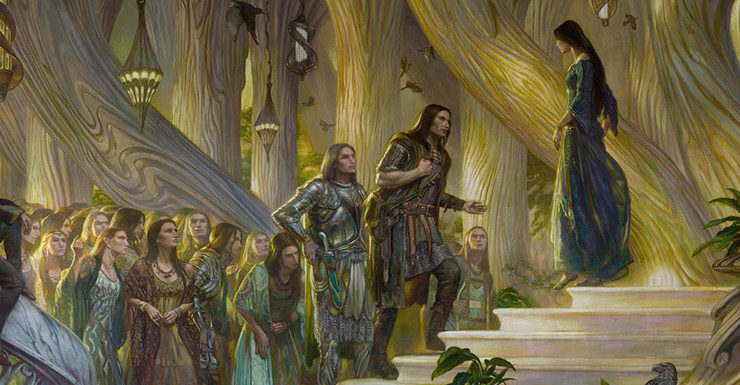In Which the Son of Barahir Meets a Girl, Accepts An Impossible Quest To Marry Her, Gets Himself Thrown In the Slammer (of Sauron), and Witnesses the Demise of the Greatest Elf In Arda
Chapter 19, “Of Beren and Lúthien,” is the most famous love story of the First Age, even of Tolkien’s entire legendarium. It is the original adventure romance between a mortal Man and an immortal Elf-maid, the legend of which Aragorn and Arwen’s own tale is an echo in The Lord of the Rings.
I’ve written about this extraordinary yarn twice on Tor.com before, first as a study of Lúthien herself (Lúthien: Tolkien’s Original Badass Elf Princess) and then again when Christopher Tolkien released the stand-alone book in 2017 (Beren and Lúthien and Their Not-So-Little Dog, Too). For a deeper walk-through of that tale, I would encourage you to check those out. But for a more contextualized primer entry that places the story within The Silmarillion, read on. As this adventure story is especially rich with exposition, oaths, callbacks, and foreshadowing, I’m going to tackle the chapter in two installments.
Dramatis personæ of note:
- Beren – Man, son of Barahir, thorn in Morgoth’s ass
- Lúthien – Maia-blooded Sinda, badass mofo
- Thingol – Sinda, scowling king, disapproving dad
- Melian – Maia, Girdle-weaver, long-suffering adviser
- Finrod – Noldo, helpful king, oath-fulfiller
- Celegorm – Noldo, jerk, son of Fëanor #3
- Curufin – Noldo, also a jerk, son of Fëanor #5
- Huan – Valinorian hound, good boy
- Sauron – Lord of Werewolves, burgeoning asshole
Of Beren and Lúthien
The Battle of Sudden Flame in the previous chapter, followed by Morgoth’s follow-up depredations, has made of Dorthonion a haunted land. Renamed Taur-nu-Fuin, the Forest under Nightshade, its only inhabitants are some of the last remnants of the House of Bëor. Which really just means thirteen dudes: Barahir and his band of not-so-merry men, which includes his son, Beren—who, in a previous chapter, we were told will somehow return from the Dead. Mysterious!
Well, these anti-Morgoth proto-rangers live in the wild like outlaws and have made a secret lair beside the last pleasant spot in the region, a lake called Tarn Aeluin (tarn-EYE-loo-een) that Melian herself is said to have hallowed in the deep past—back before any of the Eldar followed the Vala Oromë across Beleriand and over the Great Sea to Valinor, and certainly before the Maia got herself hitched to the Teleri Elf-lord who then changed his name to Thingol. Theirs is a union worth keeping in mind as we read on.
Now Morgoth really hates Barahir and his crew—these Men’s obstinacy in the face of overwhelming odds really gets Morgoth’s goat—but he can’t locate them. So he actually puts his right-hand man, Sauron, on the case. But alas, even Sauron can’t actually find their hideout. Curse that Melian and her meddling Maiar power!

It’s not that Sauron’s minions never encounter Barahir and his band of brothers. Just the opposite: they’ve deliberately chosen to snub Morgoth by slaying every evil creature they can find. Even if Sauron manages to waylay one of them, he can’t just torture the guy and expect to find out the whereabouts of the rest. These Men of the House of Bëor wouldn’t break that easily.
But Sauron, being a master of deceit, finds the weakest link in their chain: Gorlim “the unhappy” (a term which here just means unfortunate, but still, yeesh, what’d they call the other guys in this grim clan?). Gorlim sometimes goes off alone in search of his lost wife, looking for her where they’d lived in happier times before the war. Using his mastery of shadows and phantoms, Sauron tricks Gorlim into believing she is still alive and in his power. Gorlim is made to believe he can hear her voice despairing of his abandonment right there in his old house. Gorlim tries to help, is captured, tortured to no avail, then brought face to face with Sauron—you know, the guy whose face we never get to actually see in the Tolkien book that’s actually named after the guy.
He bargains with Gorlim in a sort of good cop, bad cop (good Maia, bad Maia?) style. He’s already seen Bad Sauron, who’s had him tortured. Now, if Gorlim spills the beans about Barahir, Good Sauron promises, he and his wife will be reunited and released. Desperate to save her, Gorlim agrees. He reveals the hideout of Barahir. The future Lord of the Rings then laughs, mocks him, and shows Gorlim that his wife was dead all along. Fooled you! Then Sauron takes Gorlim and puts him “cruelly to death”—which, given his tower of nightmares and his army of Orcs and wolves, must be pretty horrible. Apparently, Sauron has been learning how to be an asshole by watching his master.
With this new intel—precisely where he can find the rebel base Barahir’s lair!—Sauron sends a force of Orcs to take the outlaws unawares, striking just before dawn. And, damn it, all of them are slain! Even Barahir himself, about whose heroic exploits the Elves have at least one song topping the charts in Beleriand, is tragically slain in cold blood.
Well, wait, one dude wasn’t there….
See, if you’re a leader of some kind in Tolkien’s world and you allow yourself to be separated from your group, either you’re going to be slain, or all of them will. In this case, Beren son of Barahir was off on a spy mission at the time, far from the secret Tarn Aeluin hideout, so he was spared the slaughter. Yet while asleep one night, he has a vision, a dream wherein “a wraith of Gorlim” approaches him from across a pool of water. The spirit admits to his betrayal, and his death, and tells Beren to hurry back to his dad.
And Beren does, but it’s already too late. Argh, Wraith Gorlim! You had one job! But in truth, this was likely meant just to steer him homeward, not actually get him back in time. Also, was this dream sent by Ilúvatar? If Wraith Gorlim comes from the real Gorlim, then yes, absolutely—who but Ilúvatar knows where the spirits of Men go when they die? But if it’s just a fabricated specter of Gorlim, it might well be Ulmo’s doing! The ghost appeared to Beren across water, and we’ve seen Ulmo send dreams before to set wheels in motion. Still, we don’t really know.
Beren returns to the hideout and finds that his people are all dead. He builds a cairn for Barahir, swears to avenge his father, then hunts down those goddamned Orcs. He sees their captain actually boasting of the sport they’d made of Barahir and the Men. Moreover, this doofus Orc is holding up Barahir’s severed hand, which is still wearing the ring that had been given to Barahir by Finrod Felagund—the token of Finrod’s own oath and a symbol of the House of Finarfin. Well, surprising them all, Beren jumps out, kills the Orc captain, and makes off with his father’s hand and ring. (We’ll learn later just how good a jumper Beren is, too. Or…leaper.)
Four dark years then march on for lonely Beren, who haunts night-shrouded Dorthonion as surely as the dread that clings to it. He is determined to remain the a thorn in Morgoth’s ass, as his father was. Beren goes vegan, befriending whatever beasts and birds remain in this blasted highland, and through innumerable acts of sabotage and Orc-slaying he fights his way—basically First Blood Rambo-style—right onto Morgoth’s Most Wanted list. This is no small thing, as his name now sits right alongside the likes of Fingon, the current High King of the Noldor! Orcs won’t even go near Beren now; they’re terrified of this bogeyman among Men. I imagine Orc-heads-on-pikes strategically mounted in all the right places, possibly spelling out “FU Morgoth” when viewed from afar.
So the Dark Enemy of the World is forced to send in his right-hand man again. Sauron already got Dad, now he’s supposed to get Junior, who slipped through his fingers last time.
Therefore an army was sent against him under the command of Sauron; and Sauron brought were-wolves, fell beasts inhabited by dreadful spirits that he had imprisoned in their bodies.
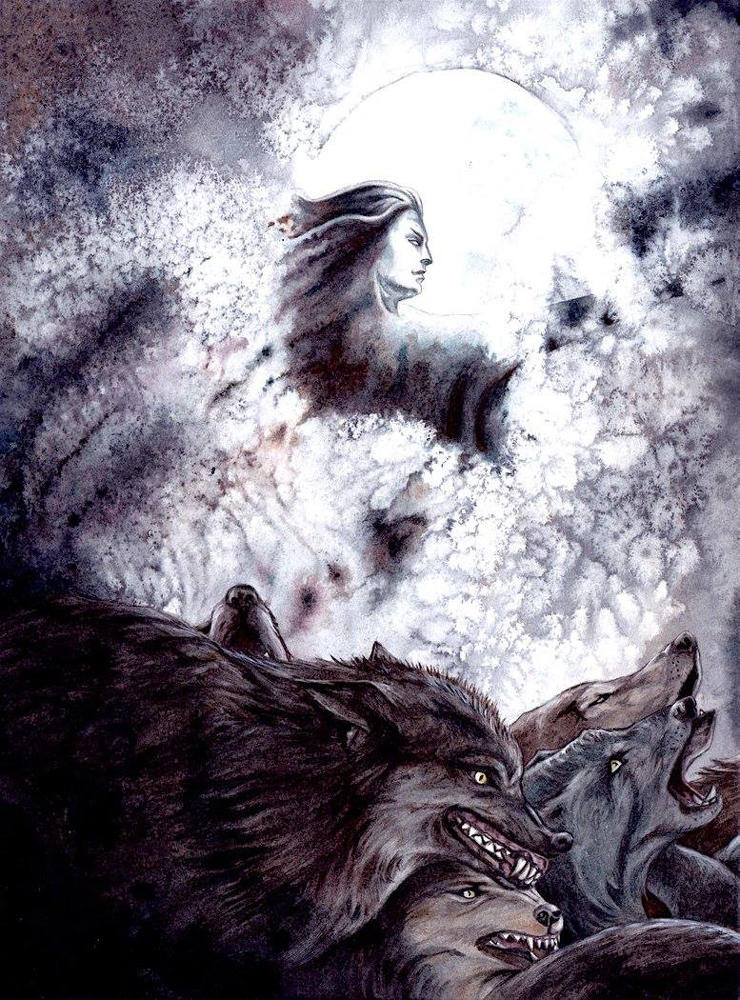
It takes an army of monsters to despoil the land further, making things harder for Beren. With wolves and werewolves sniffing around, it’s going to be more difficult to lay low. Note, also, that werewolves are something more than mean-spirited wolves. They’re antithetical to Yavanna’s creations, and thus living things flee from them—like all those birds and beasts that Beren befriended. Werewolves aren’t just bullies who happen to follow the biggest, baddest wolf among them. Like Orcs, they’re slaves to Morgoth and thereby Sauron, evil spirits imprisoned in monster bodies. These are not happy campers.
Now we’re going to see that sometimes Tolkien interchange wolves and werewolves. We can probably assume that the “shock troops,” outside of the Orcs in Sauron’s service, are common wolves bred towards violence. But werewolves are another next step up from both wolves and wargs (wargs being more of a Third Age thing). For help, let’s consult this handy chart courtesy of The Prancing Pony Podcast! Note that wargs are wolves—and that werewolves aren’t shapechangers; they’re wolflike fell beasts, often capable of speech.
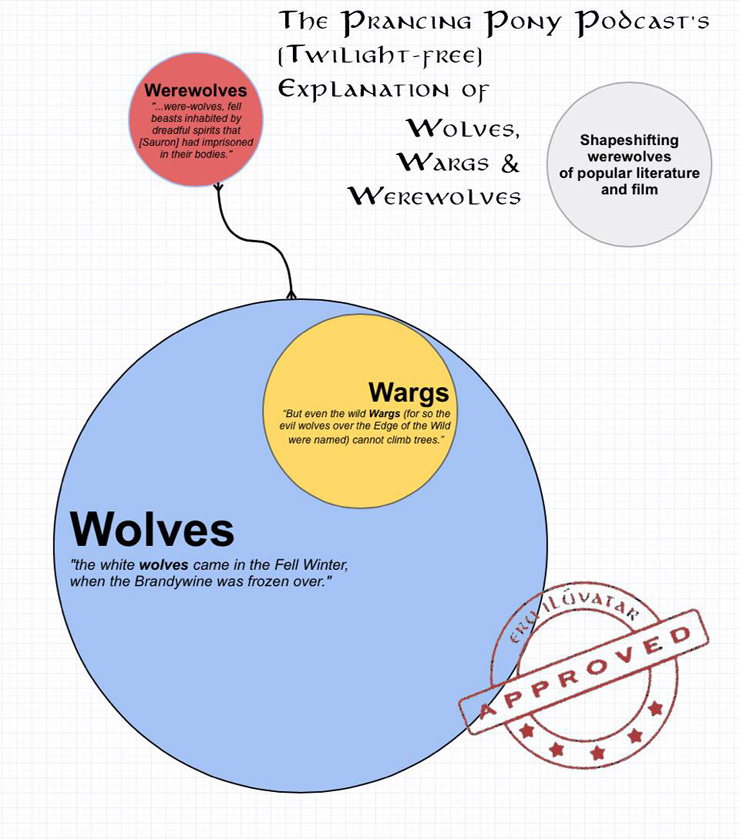
Anyway: Now with Dorthonion completely untenable, Beren finally leaves. He goes south, passing through the horrid mountains where Ungoliant once came and lived for a while to produce her hideous offspring before eventually moving on again. From the mountains of Ered Gorgoroth, he comes down into the wild and shadowy wilderness of Nan Dungortheb—that stretch of land where Aredhel (the White Lady of Gondolin) lost her escorts and barely escaped, and where Haleth and her people suffered as they marched through it. Now Beren comes through it alone and undergoes unspeakable ordeals therein that weigh him down physically and spiritually. It’s worth remembering that since Morgoth has broken the leaguer of the Noldor, this region (like many others) is even more horrific. This Valley of Dreadful Death is a place “where the sorcery of Sauron and the power of Melian came together, and horror and madness walked.” Shelob herself is very likely here with her older siblings, for she is the baby of that big horrible family. Who knows what kind of trials Beren suffers through? They’re so bad he never talks about it.
I’m breaking my own rule now by including a few snippets of verse outside The Silmarillion proper, going right to the source: Tolkien wrote The Lay of Leithian (a lay is a song or narrative poem and Leithian means “release from bondage”) as a long-verse epic first, then later adapted it into a prose form. In any case, it’s moments like these where the poetry really says it best:
Forwandered, wayworn, gaunt was he,
his body sick and heart gone cold,
grey in his hair, his youth turned old;
for those that tread that lonely way
a price of woe and anguish pay.
And then Beren comes at last to the border of Doriath, where he strolls heedless right through the Girdle of Melian, and obviously misses the NO MEN BEYOND THIS POINT signs that I assume Thingol posted up. No arrow-nocked marchwardens are there to spot him and feather him. And why can he just walk right in, a lowly mortal who was not granted permission by Doriath’s Elven-king? Well, Melian herself once foretold this (a couple of chapters ago), in an aside to her BFF, Galadriel:
And one of Men, even of Beör’s house, shall indeed come, and the Girdle of Melian shall not restrain him, for doom greater than my power shall send him
So who set this doom, this fate, upon Beren? Considering all that follows, one can easily assume Ilúvatar himself might have something to do with it. Any of the Valar would have the power to override the Girdle of Melian, but as this concerns the intertwining of the Firstborn and Secondborn of the Children of Ilúvatar, I’d say they wouldn’t likely meddle with affairs quite like this.
Fevered and delirious, Beren wanders into the forest of Neldoreth “grey and bowed as with many years of woe,” and there, for the second time in the history of Arda (that we know of), a man beholds a woman of great supernatural power in a forest glade and is thunderstruck by the encounter. Interestingly and probably not coincidentally, the last time this happened it was in a different-but-nearby forest, when Thingol meeting Melian and those two stood entranced while years passed and trees grew tall around them.
This time, it’s Beren looking upon Lúthien, Thingol and Melian’s only daughter, as she dances in the grass near the Esgalduin river. And boy is she a sight for sore, spider-haunted eyes! Enchanted by the look and the sound of her, Beren’s cares fall away, but so also does his voice.
And now his heart was healed and slain
with a new life and a new pain.
Days pass as if in a dream before their second encounter and ultimate meet-up. Here their romance begins, as doom—a bit of the good kind, a bit of the bad—falls upon them both. His came along with him and let him through the fence, but hers comes by accepting him.

and as she went he swiftly came
and called her with the tender name
of nightingales in elven tongue,
that all the woods now sudden rung:
‘Tinúviel! Tinúviel!’,
and clear his voice was as a bell;
its echoes wove a binding spell:
‘Tinúviel! Tinúviel!’
His voice such love and longing filled
one moment stood she, fear was stilled,
one moment without fear or shame,
one moment only: Beren came,
and as she stood there shimmering
her grey eyes danced a-glimmering.
While I still love the prose version of this tale in The Silmarillion, it’s worth checking out the poem. Suffice it to say that there is more detail. And enchantment, swooning, chasing, and disappearing. Fairy stuff. (Or maybe more correctly, faerie.) There’s so much of it, though it is sadly also incomplete. Yet for the sake of expediency, let’s move on. (I just can’t help but steer new readers toward that eminently romantic version of this story.)
Now, in loving Beren, Lúthien finds herself subject to the mysteries of mortality. As much as these two are fated to meet and unite the two sides of the Children of Ilúvatar coin, remember that Men have some role to play beyond the Music of the Ainur, and therefore outside the world. Thus her life, if she sees this relationship through, will become unbound to Arda. As will become obvious, this chapter contains a lot of discussion of bonds—some figurative, some literal—and the breaking of them. The Lay of Leithian actually means “release from bondage,” though it’s never stated which bonds, if any, are being referenced in the title.
Of course, it’s inevitable that Thingol, of all Elves, isn’t going to be happy about a mortal Man (1) entering his land or (2) crushing on his daughter. Can you imagine the “stranger danger” lessons he’d have given her as a little girl? He didn’t even want Noldor in his woods, certainly not filthy Men! But it was all for naught, for Lúthien is as smitten with Beren as he is with her. The age gap doesn’t bother them, either. Just because they’re separated by hundreds, very likely thousands, of years—Lúthien having been born before the first rise of the Sun and the birth of Mankind—doesn’t mean this can’t work out.
They spend a season together, with Beren living in the wild and Lúthien returning to visit him in secret each day. This is their courtship. But after Lúthien is betrayed by the Elf minstrel Daeron, who has spotted them together and suffers from a bad case of unrequited love, she is quick to get ahead of the scandal by bringing Beren right into her father’s court before his servants hunt him down. So, it’s time to meet the parents!
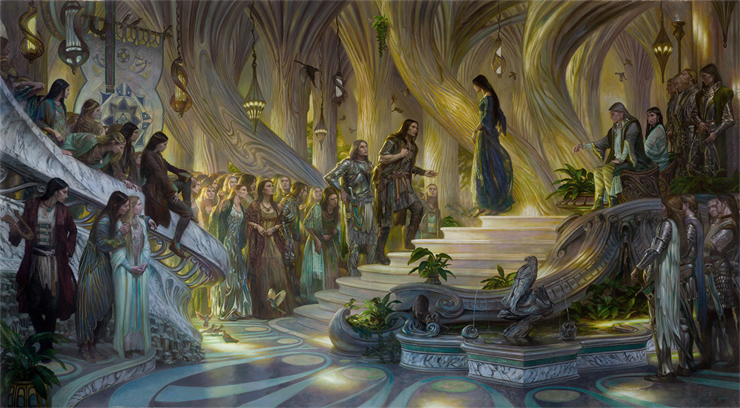
Harsh and proud words are spoken between Beren and Thingol, who lords his authority over his unwelcome guest. Insults, too. To Thingol, Beren is a thief who would steal away his daughter. Beren, in his defense, displays the ring of Barahir, which came from Finrod Felagund—and I’m not even sure if Beren at this point would know that Finrod is related to Thingol—surely that would help! But it hardly matters. Thingol is the haughtiest he’s ever been, conveniently forgetting his own case of marrying high above his station, while Beren is overly prideful once he gets past being intimidated by the majesty of the subterranean city of Menegroth, the Thousand Caves.
And frankly, Lúthien is not seeing the best of her boyfriend or her father in the dire ways in which they converse with one another. In fact, this moment of an uninvited guest arguing with a king is a bit reminiscent of Eöl and Turgon’s confrontation back in Gondolin. Then again, while both Man and King speak about Lúthien right in front of her as if she were property or some mere prize to be negotiated over, Beren had been silent only moments before, overwhelmed by the majesty of Menegroth and no doubt its very tall king. It’s only when he looked to his girlfriend and her mother (who we must recall has the light of Aman in her face!) “that it seemed to him that words were put into his mouth.” When you see the way he speaks to Lúthien directly, before and after this, you can see this isn’t normal for him. It’s as though he’s been directed to use language that Thingol can understand—of ownership, of desire. A language that will provoke him.
Still, the tension is high, and Thingol so very badly wants to have Beren put to death. What part of “into Doriath no Man shall come” did this “baseborn mortal” not understand? And here this guy, who’ll live a few more decades more at best, comes seeking to marry his daughter, who will live as long as Arda itself? The gall! Melian is, as always, the voice of reason, and she tries to caution her husband to cool his jets.
‘For not by you,’ she said, ‘shall Beren be slain; and far and free does his fate lead him in the end, yet it is wound with yours. Take heed!’
Thingol does the opposite of heed-taking and contrives for Beren a task that surely he cannot achieve. Moreover, it would likely kill the Man for him. Oh, you’re a cunning one, Thingol! So he boldly declares before everyone present that he will approve of Beren and Lúthien’s betrothal if Beren brings to him, in his hand, a Silmaril from Morgoth’s crown.
Melian possibly does a facepalm, as Thingol has now “wrought the doom of Doriath,” because the curse of Mandos is wrapped up with the Silmarils, even though up until now he’d done a fine job staying out of the affairs of the sons of Fëanor and their oath. Beren, in response, gives the Mannish equivalent of “Oh, is that all?” and agrees to it. It may be a tall order, and in the face of Thingol he may be blustery, but Beren is still a man of honor and he will absolutely do it or die trying. Lúthien becomes dispirited, which bums everyone out. The people of Doriath adore her, and are accustomed to her singing.
Meanwhile, Beren sets out on his impossible quest, and it’s evident that he doesn’t even know how to go about achieving it, yet. He doesn’t just make a beeline for Angband. He needs a plan, and his wandering feet eventually bring him to the realm of Nargothrond, that other great Elven kingdom of caves, where his possession of Barahir’s ring spares him the arrows of its watchful archers.

Beren is brought before King Finrod himself, who’s definitely the best Elf to seek for help in all of Beleriand. Not only is Finrod the kind of guy who’d probably help anyone out of a jam, he did also swear an oath to Beren’s father that he’d aid anyone of the House of Bëor. Hence that ring. So here Beren is, calling in that rolling favor. Finrod listens to his tale, about the loss of Beren’s father and his friends and kin, and of his new and very unprecedented relationship with Lúthien…who is something like Finrod’s second cousin.
But Finrod is direct, once he hears what Thingol has demanded of Beren. He says:
It is plain that Thingol desires your death; but it seems that this doom goes beyond his purpose, and that the Oath of Fëanor is again at work. For the Silmarils are cursed with with an oath of hatred, and he that even names them in desire moves a great power from slumber; and the sons of Fëanor would lay all the Elf-kingdoms in ruin rather than suffer any other than themselves to win or possess a Silmaril, for the Oath drives them.
Remember that Finrod was there when Fëanor made his blasphemous oath in old Tirion upon Túna, hundreds of years ago, there among the “contending princes” of the Noldor. Finrod hadn’t like it then, and he sure doesn’t like being even more ensnared by it now. But he’s an Elf of his word, so of course he’s going to help Beren. He points out that Celegorm and Curufin, quite possibly the least pleasant sons of Fëanor, are actually here in Nargothrond—having been driven out of their East Beleriand lands by Morgoth.
For the likes of Finrod Felagund, helping Beren on his quest isn’t something he’d just keep on the down-low. He’s a king, for one, but he’s also much too honest for such shenanigans. So he makes the announcement to his people that it’s his duty to “aid the son of Barahir in his need,” and so he must go, but also: would anyone like to come with?
Celegorm—who is there in the gathering, because of course he is—stands up in defiance of Finrod’s words. Then he actually repeats, almost word for word, the conditions of their infamous oath, citing that anyone—ahem!—who finds a Silmaril and keeps it shall earn the “pursuing hate of Fëanor’s sons.” His brother Curufin tag-teams the effort, and together they politicize Finrod’s personal oath, painting the picture of Nargothrond’s destruction should the people dare to help him. And it totally works. Finrod’s own people are swayed by the charismatic speeches of the sons of Fëanor; it has a paralyzing effect, and thereafter they elect not to go into open war again and instead favor “stealth and ambush.”
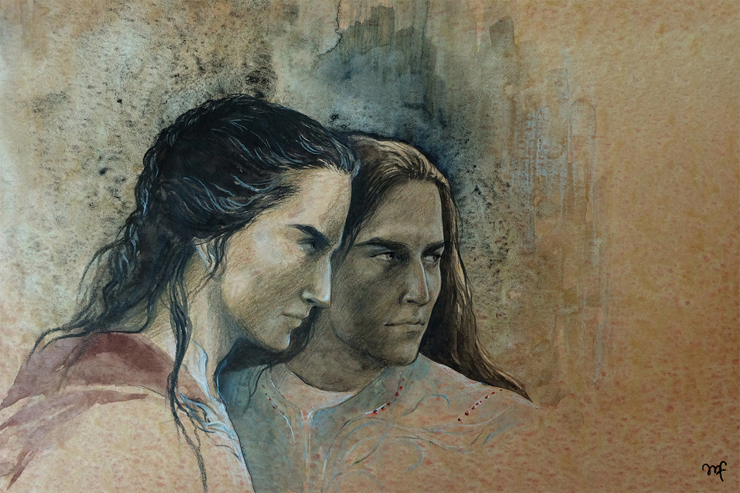
And it’s a damned shame. Beren, with Finrod’s help, purports to go and actually get a Silmaril, the thing the sons of Fëanor ill-advisedly swore to achieve. But they have chosen to twist the oath, to reinterpret it, in baleful ways—and when it’s clear Finrod’s own people aren’t going to follow him now, it even kindles the ambitions of the dastardly C-bros. Finrod might go and get himself killed now, leaving the throne of Nargothrond vacant. Ugh, these bastards. That’s Finrod they’re scheming over, man!
Dispirited by this shift in the loyalties of his people, Finrod abdicates his throne and tosses his crown to the ground. Ten Elves, at least, come forth and stay true to their king, but they suggest a steward be chosen to hold onto the kingship until Finrod’s return. Thus is Orodreth, Finrod’s little brother, given the role—which is fine with Celegorm and Curufin. Orodreth is a real patsy.
So the quest is back on, with Beren accompanied by Finrod and ten loyal Elves. They follow the River Narog north to its source, meet a company of Orcs and slay them, as you do. Then, just like Frodo and Sam will do thousands of years from now, they take up the weapons and armor of their enemies and pretend to be Orcs. As you do. But Finrod garnishes their practical trickery with some real power and makes their faces and bodies resemble Orcs as well. Illusionary magic! This gets them further north, but once they approach the north end of this river valley—almost to Anfauglith, across which lies Angband—Sauron detects them. He sends his servants to bring in these suspicious “Orcs.”
They are escorted back to Tol-in-Gaurhoth, the Isle of Werewolves, formerly known as Minas Tirith, on the island known as Tol Sirion. This was Finrod’s own tower back before the war. Here, Sauron’s power strips away their disguises. Now he can see what they are—a Man and eleven Elves—but he cannot figure out who they are or what they’re doing trying to sneak past him.
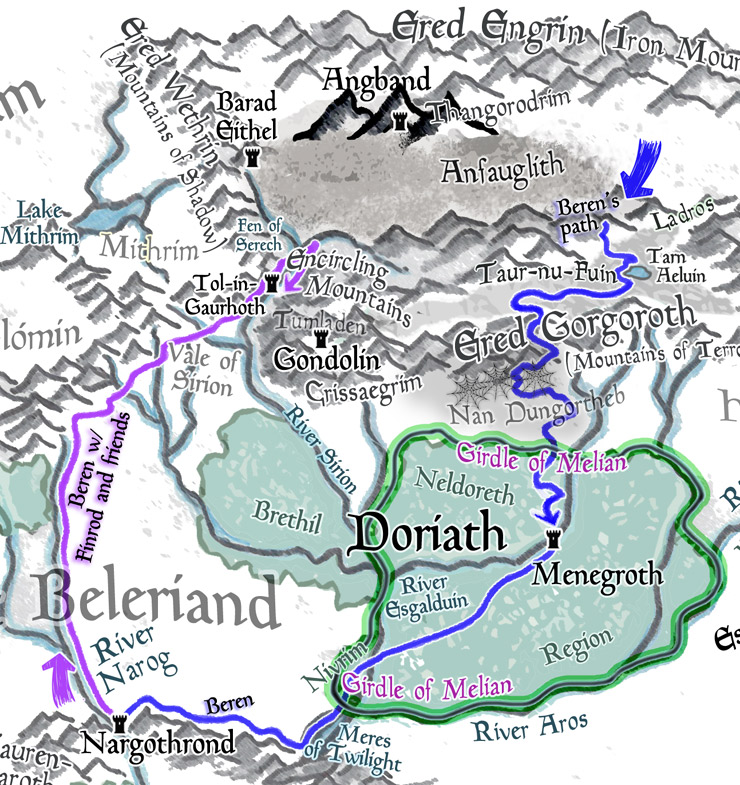
So now we come to it, that moment when it’s Finrod vs. Sauron. This isn’t like Fingolfin’s battle with Morgoth, which was sword vs. giant mace, Elf vs. Vala. This time it’s Elf vs. Maia, but instead of weapons, speed, and melee attacks, it’s with music that they engage, facing each other in their very own epic rap battle of ancient history. And here we see another prime example of music as power, as magic, as the manifestation of one’s spirit. Singing as a means of exerting power is also something that seems like an ability unique to the very wise. We see Finrod do it now, we’ll see Lúthien do it soon enough, and we’ll hear about Galadriel doing it as well someday. But you never see, for example, a son of Fëanor use music in this way. Not even Maglor, who is a minstrel.
It’s not surprising that Finrod can evoke such power and imagery with music, but it is fascinating to read about Sauron doing so. To be fair, we’re told that Sauron chants, which could be singing or just some creeply monotonous liturgy of evil words. At first it seems possible for Finrod to overcome his foe, for his words are bright and filled with conviction, conjuring the beauty of the world and the trust of kin…but Sauron with his own words exploits the guilt of the Noldor and the Kinslaying that has tainted them. And thus Finrod loses soundly and all his companions are vulnerable. Sauron imprisons the lot of them in a pit beneath his stolen tower. Why doesn’t he straight up kill them? Because he still doesn’t know who they are or what they’re up to. He can’t have secrets kept from him, nor risk any embarrassment before his boss in Angband.
Still, these guys are utterly in Sauron’s power. They’re donezo.
Then we flash over to Lúthien, who a first-time reader might suppose is just going to sit at home like a good girl this entire time. Nuh-uh, not Lúthien, who feels the “weight of horror” upon her heart when Beren is locked up. If it seems unfair or inappropriately romantic that she gets to just know when her significant other is in trouble, remember that a “great doom” lays upon Beren, and by choosing to stop and meet him properly and love him in turn, she allowed that doom to fall upon her. Now, this doom, this fate, might have some predetermination elements involved. It might be that Ilúvatar himself is trying to steer some of his Children in ways that will allow both Elves and Men (and even Dwarves) to navigate their way through Arda Marred, but at no point does he come down and command them to follow through on such nudging. Ilúvatar never just makes everything okay. No, they have to become agents of that change, and choose to join the fight against evil. Lúthien feels Beren is in peril, and she can choose to stay safe behind her mother’s Girdle…or she can venture out and rescue his ass.
But first she consults her mom, who…okay, does just somehow know or is able to learn that Beren is in the “dungeons of Tol-in-Gaurhoth without hope of rescue.” That’s very specific, Melian! And also, dungeons? Tol-in-Gaurhoth used to be the lovely Tol Sirion, Finrod’s own river estate. I mean, sure, he’s Felagund, Hewer of Caves, but no way did Finrod commission an actual dungeon in the basement of his tower. I bet it was a really slick wine cellar before Sauron came in, fouled it up, and rearranged all the furniture.
But that’s beside the point. Lúthien perceives that “no help would come from any on earth,” so she prepares to just infiltrate Sauron’s tower herself.
Digression: There isn’t much I, as a Tolkien fanboy, would try to change about the story of Beren and Lúthien—beyond “more please”—even if I could. It’s really just awesome as is. But this moment is one where I can’t help but wish Lúthien had gone to Galadriel for help; she’s totally right there in Doriath with her, and chit-chats with her mom all the time. There are so many reasons why such a team-up would make sense. Galadriel is a Noldo, and the Noldor came back to Middle-earth, at least in part, in vengeance against Morgoth for the murder of their High King and the theft of the Silmarils. It seems strange that this quest for a Silmaril is embarked upon by non-Noldor. Lúthien herself isn’t Noldorin at all; while considered fully an Elfmaid, if we get technical, Lúthien is half-Maia and half-Teler. Finally, Finrod is also in deadly peril in Sauron’s dungeon. How amazing would it be if Lúthien set out to save her boyfriend while Galadriel came along to save her big brother? Very. But alas, it was not to be. And also, Lúthien knows nothing about Finrod yet. Say, I bet Melian knew—would it have killed her tell Galadriel that her brother is in Sauron’s dungeon, too? End digression.
And that’s when Thingol finds out that his daughter is about to chase after her boyfriend. Here, he crosses the line from protective father to overreacting jailer. I think we would all respect him if, say, he just sits her down and tries his best to persuade her from risking everything as she does—but instead he imprisons her in a guarded and tall tree house. I do wonder what his long term plan was: let her out when news of Beren’s demise finally came back to Doriath? In any case, Thingol’s daughter is also the willful daughter of a Maia. Nobody puts Lúthien in a corner! She contrives her own escape by means of some seriously cool Elf magic (if this is what we would call magic): with “arts of enchantment,” she pulls a reverse Rapunzel to escape, growing her hair out long and makes of it a dark cloak and a rope. Its strands have the ability to put people to sleep: bonus! Lúthien quits Doriath altogether, and who knows, this might be the first time she’s left the borders of her father’s realm, in all these centuries.
Now it’s time to pause to properly prepare for the arrival of The Silmarillion’s most amazing quadruped, a character with heart, power, guts, a shiny coat, and, perhaps most surprisingly, good counsel! I’m speaking, of course, about Huan the wolfhound, a mighty, long-lived dog from Valinor who was once one of Oromë’s own pups. Back in those days, before things got dark, Huan (HOO-on) would have bounded merrily through Oromë’s woods, barking up a storm and having a grand old time. Then at some point he was given by the Valar’s huntsman to the third son of Fëanor, Celegorm—who, I have to assume, was far less jerky than he is now. Or, I don’t know, maybe he just gave amazing belly rubs or something.
Huan’s been with Celegorm ever since, walking faithfully beside his master even out of Aman during the flight of the Noldor—and thus falling under the doom of Mandos himself. He’d have had to sit and whine and lower his head sadly as Fëanor and his sons burned the Teleri ships, and still he was loyal. He’s clearly of some special large breed of dog, but we’re not told what type. He’s probably not Maia, but possibly akin to Thorondor, the Eagle. There are two things to understand about Huan:
- He’s been given the power of speech but he can only use it three times his entire life. It’s worth pointing out that that he’s not used any of the three yet, not in the hundreds or thousands of years he’s been with Celegorm.
- There is a prophecy concerning Huan specifically, presumably at some point while going into exile with the Noldor, though we’re not told who decreed this (Mandos himself or maybe one of his Maiar servants was there to spout it): “and it was decreed that he should meet death, but not until he encountered the mightiest wolf that would ever walk the world.”
I suppose this ensures Huan’s eventual demise, since he’s a wolfhound. He’s going to be encountering many wolves, it’s in his job description. Huan is to hostile wolves what a gigantic, heavenly mongoose might be to snakes—predisposed to slay them, particularly those in the service of Sauron or Morgoth.
So all this time he’s been Celegorm’s loyal hunting companion, and lately he’s leading the hunt against Sauron’s wolves, many of which now roam West Beleriand. And it’s on one such hunt, with Celegorm and Curufin close behind, that Huan discovers Lúthien moving just outside the trees of Doriath. Despite her arts of stealth, Huan has an excellent sniffer and he gives chase the moment he spots her. But it’s a friendly meeting—of course it is, he’s big and furry with a wagging tail. And then both their lives, as well as all of Middle-earth, are changed forever. With both Elf and dog unaware of what will happen next, he leads her to his master.
Upon seeing Lúthien and learning who she is, Celegorm and Curufin ratchet up their prickishness. For starters, they were ostensibly out hunting Sauron’s wolves but they’ve also been hoping to discover Finrod’s fate—and not because they’re concerned for his safety but they sure would like to make sure he stays gone. Now they see a real prize in Lúthien. Worse, she trusts these Noldorin princes right away, almost inexplicably. Surely she grew up hearing her father mouth off about the Noldor, especially the sons of Fëanor, from whom Thingol wisely has kept his distance. (Right up until he shot himself in the foot by declaring his desire for a Silmaril.) C’mon, girl, you’re smarter than this!
Promising to give her help once they return to Nargothrond, the C-brothers bring her back…only to betray her! They lock her up, take away her sleep-inducing cloak, and keep her from talking to anyone else. Their plan is to fulfill their father’s oath only in the most cowardly and self-serving roundabout of ways:
- Wait for news of Finrod’s death—wherever or whenever that may be!
- Keep Lúthien hostage.
- Force Thingol to consent to Celegorm marrying her (as if).
- Profit (become the lords of Nargothrond and the most powerful Elf-princes ever).
They’ll maybe consider possibly starting to maybe begin thinking about seeking those pesky Silmarils—or maybe permit someone else to get them, but only once they’ve achieved all of the above. It’s not a good plan, but they’re not good people, and it’s going to cost them. These two will get their comeuppances, surely! But probably not right away.
But you know who is good people? Huan. Better than the Brothers C, that’s for sure. This hound of Valinor, who is “true of heart,” actually spends time with Lúthien, listens to her plight, and loves her unconditionally, as a dog does. From the moment he first met her, he knew she was good people, too. So in the dark of night, he goes to her door and speaks! He tells her about his plan to break her out of her Fëanorean cage. Oh, I’m sure it’s a posh Elvish prison-suite suitable for the “future wife” of Celegorm, but still: nobody puts Lúthien in a corner! By the way, this is Huan’s Speaking Allowance #1; it says much about him, and Lúthien, that he chooses this moment.
He fetches her cloak like a good boy, then sneaks her “by secret ways” out of Nargothrond. Even better, as they head north together under cover of night, he lets her ride him (nobody, but nobody, gets to do that) “even as the Orcs did at times upon great wolves.” They’re in a hurry now.
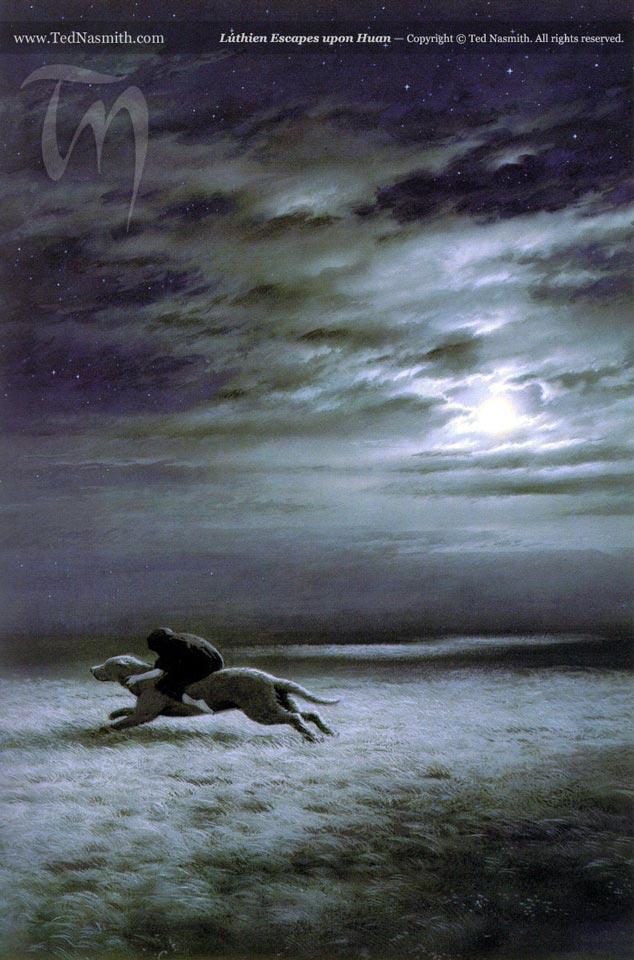
Now we return to Beren in the dungeons of Tol-in-Gaurhoth. One by one, Sauron has been trying to “wheedle” the truth from his mysterious guests and not having much luck with it. This particular band of adventurers is tough. Not so much good cop, bad cop this time—Sauron has been employing the more direct bad werewolf, worse werewolf method, wherein a spirit-possessed monster canine devours them one at a time until someone talks. And none of them are talking. Every single one of the Elves loyal to Finrod have now been eaten, probably right in front of him and Beren.
Sauron is now down to two prisoners: the one mortal Man in their group plus the obviously wise and tenacious Noldo who tried to oust him with song. At last, though, he decides to send a werewolf to devour Beren, not knowing that this was that elusive, hard-to-kill son of Barahir that Sauron had tried to hunt down back in Taur-nu-Fuin. Isn’t it ironic? Don’t you think?
In any case, it looks like Beren’s number is up. The monstrous wolf closes in…
And that’s when Finrod shows his quality (again) and fulfills his oath to the last. Finrod Felagund, Hewer of Caves, now becomes the breaker of chains; with desperation and Calaquendi mojo he rolls a natural “20” on his final Strength check and bursts from his bonds, then wrestles the werewolf to death, with his own bare hands and teeth. In the process, Finrod is torn up and suffers mortal wounds.
With the last of his strength, the eldest son of Finarfin speaks to the grieving Beren, whose life he has just saved.
‘I go now to my long rest in the timeless halls beyond the seas and the Mountains of Aman. It will be long ere I am seen among the Noldor again; and it may be that we shall not meet a second time in death or life, for the fates of our kindreds are apart. Farewell!’ He died then in the dark, in Tol-in-Gaurhoth, whose great tower he himself had built. Thus Finrod Felagund, fairest and most beloved of the house of Finwë, redeemed his oath;
Finrod, hewer of caves, son of Finarfin, big brother of Galadriel, finder of Men, declarer of meaningful and benevolent oaths…
I would say more, but… For me the grief is still too near.
“Spoiler” Alert: Finrod’s spirit does indeed go to the Halls of Mandos, as all cooperative Elven spirits do. But it doesn’t sound like he has to wait long to be re-embodied in Valinor proper. In the same paragraph in which we’re told that he now “walks with Finarfin his father” again, and probably reunites with his long-distance girlfriend, Amarië, we’re also given another reminder that Beleriand will be “changed and broken” in due time by “destroying seas.” Don’t get too comfortable here, Tolkien seems to be saying, even when things are looking up.
In the next installment we’ll discuss what becomes of Beren, who’s only just been saved from death and still languishes in the dungeon and has now just witnessed the death of his friend. But you know, it’s not like there aren’t more werewolves in Tol-in-Gaurhoth. Sauron’s got a bunch. We can only hope there’ll be some comeuppance for the bastard who’ll one day forge the One Ring to Rule Them All in the fires of Mount Doom.
Top image from “Beren and Lúthien in the Court of Thingol and Melian” by Donato Giancola
Jeff LaSala can’t leave Middle-earth well enough alone. Tolkien geekdom aside, Jeff wrote a Scribe Award–nominated D&D novel, produced some cyberpunk stories, and now works for Tor Books. He is sometimes on Twitter.










